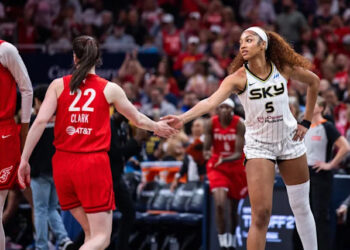In a groundbreaking move that could reshape the global basketball landscape, the NBA has announced plans for an ambitious European league dubbed the “Basketball Champions League” (BCL). This league will feature 16 elite teams from across Europe and beyond, structured in a dynamic format designed to ignite rivalries, boost global engagement, and elevate the sport’s presence on the continent. With the BCL, NBA Europe is making a definitive statement: the future of basketball is global, and Europe is no longer just a talent pool—it’s a proving ground.
A Landmark Evolution for European Basketball
For decades, the NBA has drawn top international talent from Europe, with stars like Dirk Nowitzki, Luka Dončić, Giannis Antetokounmpo, and Nikola Jokić becoming household names. However, while the NBA has always been the pinnacle of the sport, its footprint in Europe remained largely promotional—hosting preseason exhibitions, grassroots camps, and the occasional regular-season game abroad.
That changes now. The Basketball Champions League represents a structural shift: the NBA isn’t just showcasing the game in Europe—it’s investing in it, building it, and giving it the organizational muscle of the world’s most successful basketball league.
The Format: 16 Teams, Elite Talent, Continental Showdowns
The new BCL will consist of 16 teams, handpicked from Europe’s premier basketball clubs. Early reports suggest a mix of storied franchises such as Real Madrid, CSKA Moscow, Fenerbahçe, and Olympiacos, alongside up-and-coming powerhouses from France, Germany, Italy, and the Balkans. The goal is to ensure competitive balance while also tapping into established fan bases.
The league will follow a hybrid system combining round-robin group stages and knockout rounds, reminiscent of the UEFA Champions League in football. Teams will be split into four groups of four, with the top two from each group advancing to an eight-team playoff bracket. This structure guarantees a high-stakes environment throughout the season, with every game carrying weight.
Furthermore, cross-continent matchups are planned to be a major draw. Though the initial phase focuses on Europe, future seasons may include wild-card entries or interleague play with teams from Africa, the Middle East, and even South America. This cross-pollination of basketball cultures could revolutionize the way the sport is consumed and played internationally.
Commercial and Cultural Impact
The NBA’s expansion into Europe through a league structure brings significant commercial potential. Media rights are expected to be auctioned to both regional and global broadcasters, with tech giants like Amazon and Apple rumored to be interested in streaming deals. This would provide unprecedented visibility for European clubs and athletes, creating new revenue streams and financial stability in a sport where clubs often operate on tight margins.
Sponsorships will likely follow suit. The NBA’s global marketing reach, paired with local fan fervor, is a goldmine for brands seeking to connect with international youth audiences. Expect jersey sponsors, in-arena activations, and exclusive merchandise drops tailored to European tastes and culture.
On a cultural level, this league could bridge the stylistic differences between European and American basketball. European basketball, known for its team-oriented play, tactical nuance, and strong fundamentals, will now be showcased on a stage with NBA-level presentation, athleticism, and storytelling. This fusion could redefine the modern game and influence basketball development worldwide.
Challenges Ahead
Despite the excitement, the NBA’s European venture isn’t without hurdles. The EuroLeague—Europe’s existing top-tier competition—has long dominated the landscape. Clashes over scheduling, player contracts, and allegiance are expected. Some EuroLeague stakeholders have already voiced concerns about potential talent drain and competition fragmentation.
Additionally, navigating the complex political and regulatory environments of multiple countries will require deft coordination. From travel logistics and visa policies to tax regulations and broadcasting laws, the NBA will need to tread carefully to ensure smooth operation.
Yet, if any organization has the experience, capital, and influence to pull it off, it’s the NBA.
A Bold Vision for the Game’s Future
The Basketball Champions League is more than just a tournament—it’s a vision of basketball’s next frontier. It signals the NBA’s commitment to not just exporting its product, but co-creating the future of the game with international partners. For fans, players, and investors, the BCL offers a new arena of possibilities: local pride on a global stage, emerging rivalries, and the kind of drama only high-level competition can provide.
In short, NBA Europe is no longer a side project—it’s a revolution. The ball is
in motion, and the world is watching.











